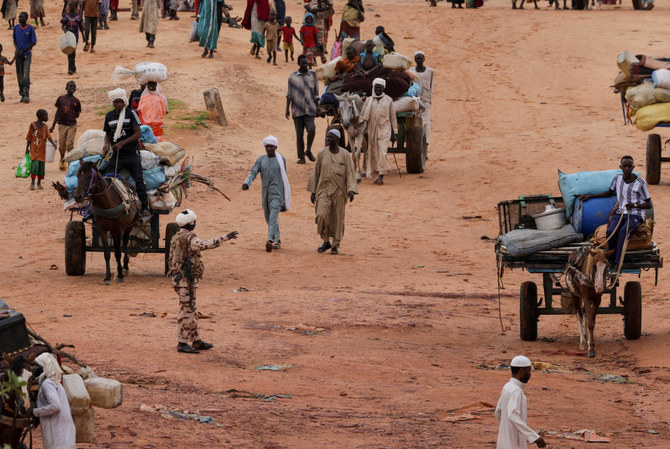
- ARAB NEWS
- 06 May 2024

WAD MADANI: Fighting between two rival generals has spread to cities in war-ravaged Sudan’s south, witnesses said Friday, raising concerns for hundreds of thousands who have fled violence in the Darfur region.
The vast western region as well as the capital Khartoum have seen some of the worst bloodshed since fighting erupted on April 15 between Sudan’s army and the paramilitary Rapid Support Forces (RSF).
Battles resumed late Thursday in the North Darfur state capital of El Fasher, witnesses said, disrupting nearly two months of calm in the densely populated city that has become a shelter from the shelling, looting, rapes and summary executions reported in other parts of Darfur.
“This is the biggest gathering of civilians displaced in Darfur, with 600,000 people in El Fasher,” said Nathaniel Raymond of the Humanitarian Research Lab at the Yale School of Public Health.
One resident told AFP: “As night fell, we heard battles with heavy weapons from the city’s east.”
Witnesses also reported fighting in Al-Fulah, the capital of West Kordofan state which border Darfur.
The conflict had already expanded to North Kordofan state, a commercial and transportation hub between Khartoum and parts of Sudan’s south and west.
Numerous rights groups and witnesses who fled Darfur have reported the massacre of civilians and ethnically driven attacks and killings, largely by paramilitary forces and their allied Arab tribal militias.
Many have fled across the western border to neighboring Chad, while others have sought refuge in other parts of Darfur, where the International Criminal Court is looking into allegations of war crimes.
The region has long been the site of deadly fighting since a war that erupted in 2003 and saw the feared Janjaweed -precursors of the RSF- unleashed on ethnic minority rebels.
Fighting in the latest conflict has concentrated on El Geneina, the capital of West Darfur state, where the United Nations suspects crimes against humanity have been committed.
Nyala, Sudan’s second city and capital of South Darfur state, has been in the throes of recent fighting, with reports of thousands of residents fleeing.
The United States on Thursday urged the warring sides “to cease renewed fighting in Nyala… and other populated areas, which has caused death and destruction”.
“We are particularly alarmed by reports of indiscriminate shelling carried out by both” parties, State Department spokesman Matthew Miller said in a statement.
“Every day this senseless conflict continues, more innocent civilians are killed, wounded, and left without homes, food or livelihoods.”
Further east, a resident of Al-Fulah said “the RSF are confronting the army and the police, and public buildings have been set on fire during their fire exchanges”.
“Shops were looted and there are dead on both sides, but no one can get to the bodies in this chaos,” said another witness in Al-Fulah.
The conflict has killed at least 3,900 people nationwide, according to a conservative estimate by the Armed Conflict Location & Event Data Project.
The actual toll is believed to be much higher, as the fighting restricts access to many areas.
The heads of 20 global humanitarian organizations said in a joint statement on Tuesday the international community has “no excuse” to stall on helping civilians.
It noted that two appeals for aid to support some 19 million Sudanese “are just over 27-percent funded. Please change that”.
The signatories pointed out that more than 14 million children need humanitarian aid and over four million people have fled the fighting, either within Sudan or as refugees to neighboring states.
With the arrival of the rainy season in June, epidemic risks have multiplied and damage to crops risks exacerbating food insecurity.
The United Nations voiced particular concern for women and girls caught up in the conflict, amid “shocking incidence of sexual violence, including rape”.
Leila Baker of the United Nations Population Fund said this week that “we’ve seen an increase of more than 900 percent in the conflict areas of gender-based violence”.